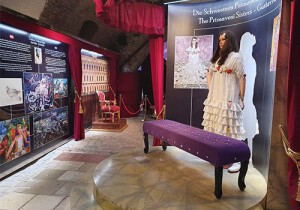Who were Empress Elisabeth’s favorite siblings? Some of Sisi’s siblings had funny first names: Ludwig (called Louis), Helene (called Nené), Carl Theodor (called Gackel), Marie, Mathilde (called Spatz), Sophie and the baby Max Emanuel (called Mapperl)
Elisabeth was the fourth child of ten children from the marriage between Princess Maria Ludovika (1808-1892) and Duke Maximilian in Bavaria (1808-1888). The father, known as “Schürzenjäger” had several illegitimate children. Two of the legitimate children (Wilhelm Karl 1832-33) and Maximilian (born and died on December 8, 1845) died immediately or after a short time. The elder brother was Ludwig Wilhelm Herzog in Bayern (1831-1920), who renounced his right of the firstborn in favor of a middle-class actress named Henriette Mendl. He was militarily successful up to General der Kavallerie. His daughter Marie Louise Mendl later went down in history as Marie Louise von Larisch-Wallersee. She knew more about the Mayerling tragedy. Elisabeth had a close relationship with her older sister Helene (1834-1890), known as Néné, throughout her life. Despite the scandal in Bad Ischl when Emperor Franz Joseph chose young Sisi as his future wife. Néné thought it would be intended for that. At the age of 22, Helene also married the Hereditary Prince Maximilian Anton von Thurn und Taxis. It must have been a good marriage in contrast to the younger sisters. Unfortunately, the marriage didn’t last very long, as Maximilian died at the age of just 35 from a severe kidney disease. They had four children, for whom she took guardianship. Helene died at the age of 56 from an abdominal illness. Elisabeth was brought up together with her sister Helene, called Néné, who was three and a half years her senior. An Englishwoman acted as governess and looked after the girls for four years. How formative this time was is shown by the fact that the duchesses used English as their secret language until the end of their lives. Despite the embarrassment in choosing a bride, Helene remained a close confidant of Sisi throughout her life. Even in difficult times, she always had a positive influence on the younger sister. Sisi had a special relationship with her younger brother Carl Theodor (1839-1909), known as Gackel. He later became a well-known ophthalmologist. He founded the private eye clinic Herzog Carl Theodor in Munich and performed around 5,000 cataract operations. Elisabeth’s younger sister Sophie (1847-1897) only lived to be 50 and had a fateful life. At first she had a few suitors, including Duke Philipp von Württemberg, Prince Louis of Portugal and Ludwig Viktor from Austria, who was, however, homosexual. Her cousin and childhood friend Ludwig II was also considered a candidate, but he broke off the engagement. They married Ferdinand von Alecon, who was a grandson of the last French king. They lived in exile in England, where Sophie did not feel very comfortable. Sophie gave birth to a son and shortly thereafter they moved to France. Sophie began to suffer from depression and ended up in the mental hospital, which she was able to leave cured seven months later. She died a tragic death during a fire in Paris. Another younger sister of Elisabeth was Marie Sophie Amalie, Duchess in Bavaria (1841-1925). She was the last Queen of the Two Sicilies by marrying Crown Prince Franz, whose father was King Ferdinand II. He soon died and his son Franz was in principle incapable of governing. The events of that time forced her to flee the declining kingdom into exile in Rome in 1861. Marie always caused a stir and provocation. In 1862 she secretly gave birth to a daughter whom she gave up for adoption. She later confessed this misstep to her husband. She was in competition with Sisi, especially when riding. The two didn’t get along very well. The next younger sister was Duchess Mathilde Ludovika in Bavaria (1843-1925). She got along very well with Marie Sophie, since she was married to Count Louis of Trani, who was the younger brother of the King of the Two Sicilies. The marriage was unhappy and she separated from him. Because of her squeaky voice, Mathilde was called “Spatz” . The youngest brother was Maximilian Emanuel in Bavaria (1849-1893), who devoted himself to the military and died relatively young at the age of 44 from a severe gastric hemorrhage. Tip from Sisi’s Amazing Journey: Find out more about Elisabeth’s childhood at Sisi’s Amazing Journey and the Sisi Museum.
More info: Sisi’s Amazing Journey, new attraction in Vienna, exhibition & VR boat ride, 1010 Vienna (amazing-sisi.at)Sisi Museum – Hofburg Vienna (hofburg-wien.at)



